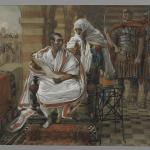A good friend and great colleague in the study of U.S. history, Leo Ribuffo, has died. Details and obituaries have yet to surface. He was older and sometimes frail, so the news of his demise was not a surprise even if its suddenness shocked.
I have known Leo since he identified himself as the reader of my then manuscript, an intellectual biography of J. Gresham Machen. Ever since, I have known Leo to be unpredictable and insightful in his judgments, always curious about people with whom he might differ, unafraid to defy the intellectual or political consensus, and a gracious and witty conversationalist (not to mention that he enjoyed a good steak and cigar — in that order). He was also the historian responsible for referring to the colonial revivals of Edwards and Whitefield not as the Great but Pretty Good Awakening — as a way of suggesting that the terms we use may actually attribute significance we do not intend.
I will miss, in particular, Leo’s uncanny ability to capture the oddity of aspects of American religion and politics that we generally take for granted. One example comes from a review he wrote of George Marsden’s The Soul of the American University and the difficult questions that surround discerning secular prejudice against religion along with what counts as normal in secular scholarship:
Suppose that a candidate for a professorship in European diplomatic history volunteers that he is a “fairly traditional Protestant of the Reformed theological heritage,” as Marsden describes himself (p. 7). That phrase is sufficiently vague to cover not only Marsden, but also the Niebuhrian Baptist Jimmy Carter, the fundamentalist Jerry Falwell, and the Pentecostal Pat Robertson. Could prospective employers probe further without violating federal law? If so, they might want to know whether “traditional Protestantism” in this instance includes the theory of premillennial dispensationalism, and specifically, whether the job applicant agrees with many other dispensationalists that the Common Market was predicted in the Bible and now signals the imminent return of Jesus Christ. Do affirmative answers automatically bar the candidate from further consideration?
This is not a rhetorical question. The premillennialist job seeker might also be the foremost expert on the economics of the Common Market and a great teacher willing to entertain secular perspectives in the classroom. My own view is that a dispensationalist reading of the Bible, which resembles deconstructionist literary criticism rather than private revelation, should not automatically disqualify a job candidate. After all, I coexist in the academy with men and women whose methodological premises I dispute, including economists who reduce human motives to rational expectations, political scientists who formulate grand theories of the presidency without examining the private papers of any president, and cultural critics who think Jean Baudrillard understands the United States better than C. Wright Mills. And recent American intellectual life would have been poorer without the Hegelian social critic Herbert Marcuse and the Freudian metahistorian Norman 0. Brown, both of whom teetered on the verge of supernaturalism.
Nonetheless, a dispensationalist diplomatic historian would be a tough sell in most history departments. Indeed, Marsden probably would be more wary of our hypothetical job seeker than I am. An evangelical Protestant himself, he has a vested interest in the right kind of theological conservative, and he clearly regards populist fundamentalists who indulge in Bible prophecy as the wrong kind. Whatever the outcome, the resulting department meeting would illustrate some of the prosaic, nonintellectual reasons why the acad- emy came to exclude normative religious teachings.
That is vintage Ribuffo — a lapsed Roman Catholic in background and a political liberal who knows more Protestant theology that many evangelicals and also understands that the theories that animate contemporary politics and scholarship are no less arcane (and contested) than the teachings found in the Scofield Reference Bible.
That is a perspective that both the study of U.S. politics and Christianity needs. Coupled with an adult beverage and a decent cigar, such an outlook made an evening with Leo a delight.
I am so glad to have known him, equally sad to be denied his company.












